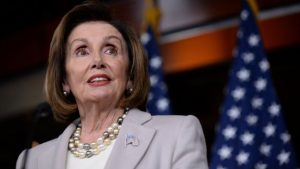InternationalLife Style
Trump impeachment: House votes to formalise inquiry

The measure detailed how the inquiry will move into a more public phase and was not a vote on whether to impeach the president.
The vote was the first formal test of support for impeachment in the Democratic-controlled house.
The resolution passed along party lines, as expected.
It also sets out the rights Mr Trump’s lawyers would have.
President Trump is accused of trying to pressure Ukraine into investigating unsubstantiated corruption claims against his political rival, Joe Biden, and his son who worked with Ukrainian gas company Burisma.
Mr Trump denies wrongdoing and calls the impeachment inquiry a “witch hunt”.
Also on Thursday, another White House official present on the Ukraine call began testifying, and was expected to corroborate earlier statements about conditions placed to the release of US military aid to Ukraine.
Republicans have criticised Democrats for the closed hearings up to this point, in which Republican lawmakers have also taken part. But Democrats insist they were needed to gather evidence ahead of the public stage of the inquiry, and deny allegations they have been secretive.
The vote moves the inquiry into a new phase, which could eventually see articles of impeachment recommended against Mr Trump. If that happened, and the House voted to pass the articles, a trial would be held in the Senate.
What does the resolution say?
Earlier this week, Democrats in the House released an eight-page document setting out a two-stage process for the next phase of the inquiry.
In the first stage, the House Intelligence Committee would continue its investigations and hold public hearings. It would have the right to make public transcripts of depositions taken in private.
In the second stage, a public report on the findings would be sent to the House Judiciary Committee which would conduct its own proceedings and report on “such resolutions, articles of impeachment, or other recommendations as it deems proper”.
President Trump’s lawyers would be allowed to take part in the Judiciary Committee stage. Republicans on the committees would be able to subpoena documents or witnesses although they could still be blocked as both committees are controlled by Democrats.
Democrats are planning public hearings to be held in coming weeks and are considering the possibility of drafting articles of impeachment against the president.
What’s behind the impeachment inquiry?
At the heart of the impeachment inquiry, which was announced by House Speaker Nancy Pelosi last month, is a phone call on 25 July between Mr Trump and Ukrainian President Volodymyr Zelensky.

A rough transcript of the call shows Mr Trump asking Mr Zelensky to investigate unsubstantiated corruption claims against Joe Biden, a leading Democratic candidate to challenge Mr Trump for the White House next year, and his son, Hunter.
The Trump-Zelensky phone call was the subject of a complaint by a whistleblower, whose identity has been closely protected by lawmakers. On Wednesday, a conservative author named a CIA officer as the whistleblower.
What about Thursday’s testimony?
Tim Morrison, who served as top adviser on Russia and Europe at the National Security Council, is testifying before lawmakers.
He was one of the officials authorised to listen in on Mr Trump’s call with the president of Ukraine, and resigned from his position on Wednesday.
Mr Morrison is due to provide a first-hand account of conversations with Ukrainian officials about the president’s alleged demands tying military aid to investigation into the Bidens.
This would confirm prior testimony by Bill Taylor, the top US diplomat in Ukraine.
Meanwhile, House investigators invited former US National Security Adviser John Bolton to testify on 7 November. His lawyer, Charles Cooper, told US media his client was not willing to appear voluntarily but that he was ready to accept a subpoena – or legal summons to compel testimony – on Mr Bolton’s behalf.
US media say Mr Bolton was alarmed by a back-channel operation in Ukraine carried out by President Trump’s private lawyer, Rudy Giuliani, who acknowledged last month having asked Ukraine to investigate Mr Biden.
Source:Fiilafmonline/BBC



